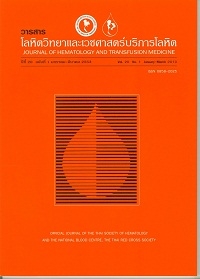การศึกษาประสิทธิภาพของ Dapsone และ Colchicine ในการรักษาภาวะ เกล็ดเลือดต่ำจากออโตอิมมูน : ประสบการณ์ 6 ปีในโรงพยาบาลจุฬาลงกรณ์
คำสำคัญ:
ITP, Colchicine, Dapsoneบทคัดย่อ
บทคัดย่อ
บทนำ : ปัจจุบันยา corticosteroid ถูกใช้เป็นยาหลักในการรักษาผู้ป่วยภาวะเกล็ดเลือดต่ำจากออโตอิมมูน (Immune thrombocytopenia; ITP) แต่อย่างไรก็ตามยังมีผู้ป่วยส่วนหนึ่งที่ไม่ตอบสนองต่อการรักษาหรือไม่สามารถลดระดับยา corticosteroid ลงได้ (refractory ITP) ซึ่งการใช้ steroid เป็นเวลานานทำให้เกิดผลเสียจากผลข้างเคียงของยาได้มาก จึงมีความพยายามนำยาชนิดอื่นซึ่งผลข้างเคียงต่ำกว่ามาใช้ จากรายงานที่ผ่านมาพบว่า dapsone และ colchicine เป็นยาที่ราคาไม่แพง ผลข้างเคียงน้อย และมีประสิทธิภาพในการรักษาภาวะ refractory ITP งานวิจัยนี้ทำขึ้นเพื่อศึกษาประสิทธิภาพของยาทั้งสองชนิดในผู้ป่วย refractory ITP วิธีการ : เป็นการศึกษาแบบย้อนหลัง โดยทำการทบทวนเวชระเบียนผู้ป่วยนอก โรงพยาบาลจุฬาลงกรณ์ ที่ได้รับการวินิจฉัยเป็น ITP โดยเลือกผู้ป่วย ITP ที่ไม่ตอบสนองต่อ corticosteroid หรือ ไม่สามารถลดขนาดยาได้ มีระดับเกล็ดเลือดต่ำกว่า 50 x109/L และได้รับยา dapsone 100-200 มก./วัน และ/หรือ colchicine 1.2 มก./วัน ผู้ป่วยที่ใช้ยาชนิดอื่นที่มีผลต่อระดับเกล็ดเลือดร่วมด้วยจะถูกคัดออกจากการศึกษา การตอบสนองต่อยาหมายถึงระดับเกล็ดเลือดหลังได้ยามากกว่า 50 x109/L ผลการศึกษา : จากผู้ป่วยทั้งสิ้น 23 คนพบมีเหตุการณ์ที่ได้รับยาทั้งสองชนิด 33 ครั้ง โดยผู้ป่วย 6 ครั้งได้ dapsone เพียงชนิดเดียว, 17 ครั้งได้ colchicine เพียงชนิดเดียว และมี 10 ครั้งได้ยาทั้งสองชนิดร่วมกัน ค่ามัธยฐาน (พิสัย) ของระยะเวลาที่ได้รับการรักษาของผู้ป่วยแต่ละกลุ่ม คือ 46 สัปดาห์ (6-102 สัปดาห์), 11 สัปดาห์ (3-181 สัปดาห์) และ 11 สัปดาห์ (4-83 สัปดาห์) ตามลำดับ การตอบสนองโดยรวมของผู้ป่วยที่ได้รับยา dapsone, colchicine และ ทั้งสองชนิดเป็นร้อยละ 83.3, 52.9 and 40.0 ตามลำดับ โดยผู้ป่วยที่มีการตอบสนองต่อ colchicine พบว่าระยะเวลาการเป็นโรคสั้นกว่าผู้ป่วยที่ไม่ตอบสนองอย่างมีนัยสำคัญ (ค่ามัธยฐาน 85 วัน และ 1,511 วัน ตามลำดับ, p = 0.04) พบภาวะ subclinical hemolysis จำนวน 3 ใน 16 รายในผู้ป่วยที่ได้รับยา dapsone และสามารถหายเองได้เมื่อหยุดยา สรุป : Dapsone และ colchicine เป็นยาที่มีประสิทธิภาพดีและผลข้างเคียงต่ำในการรักษาภาวะ refractory ITP
Key Words : ITP, Colchicine, Dapsone
Abstract
Background : Corticosteroid is the first-line treatment for immune thrombocytopenia (ITP). However, some patients are refractory or dependent on high doses of steroid to maintain platelet counts. Due to several side effects of long-term corticosteroid, other relatively less toxic medications are required. Two inexpensive agents, colchicine and dapsone have been reported to be safe and effective in a subset of refractory ITP. The objective of the study is to evaluate the efficacy of colchicine and/or dapsone in ITP patients. Method : A retrospective analysis was performed. Medical records of adult ITP patients who were refractory to or dependent on high doses of corticosteroid, had platelet counts below 50 x 109/L and were treated with 100-200 mg/day of dapsone and/or 1.2 mg/day of colchicine were reviewed. Patients who concomitantly received increased doses of steroid or other treatments were excluded. A response was defined as a platelet count of 50 x 109/L or over and no clinical bleeding. Results : Thirty-three treatment events in 23 patients were analyzed. Dapsone alone was used in 6, colchicine alone in 17 and both medications were given in 10 events. The median duration of treatment were 46 (range 6-102), 11 (3-181) and 11 (4-83) weeks, respectively. The overall response rates for dapsone, colchicine and both drugs were 83.3%, 52.9% and 40.0%, respectively. The median duration of diseases is significantly shorter in the cases responsive to colchicine compared with that of no response group (85 days vs.1511 days, respectively, p = 0.04). Three of 16 patients receiving dapsone had subclinical hemolysis, which resolved after drug discontinuation. Conclusion : The results suggest that dapsone and/or colchicine are effective and well-tolerated second-line treatments for chronic refractory immune thrombocytopenia.
Key Words : ITP, Colchicine, Dapsone



